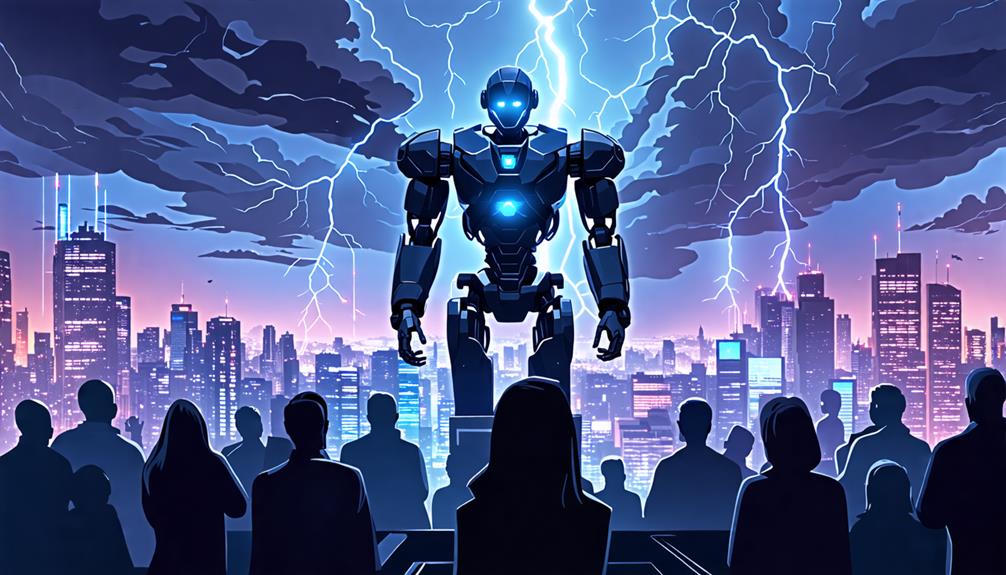
You might worry about AI overthrowing humanity, but current technology still relies heavily on human oversight. While AI's rapid development fuels such fears, especially with its presence in sectors like healthcare and finance, it primarily augments human capabilities rather than replacing them entirely. Ethical and regulatory frameworks are in place to manage and mitigate risks like privacy issues and job displacement. Moreover, experts continually assess AI's impact to ensure technology aligns with human welfare and ethical standards. The real question isn't whether AI will overthrow humanity, but how we'll incorporate evolving technologies responsibly—there's a lot to consider for a secure future.
Defining Artificial Intelligence
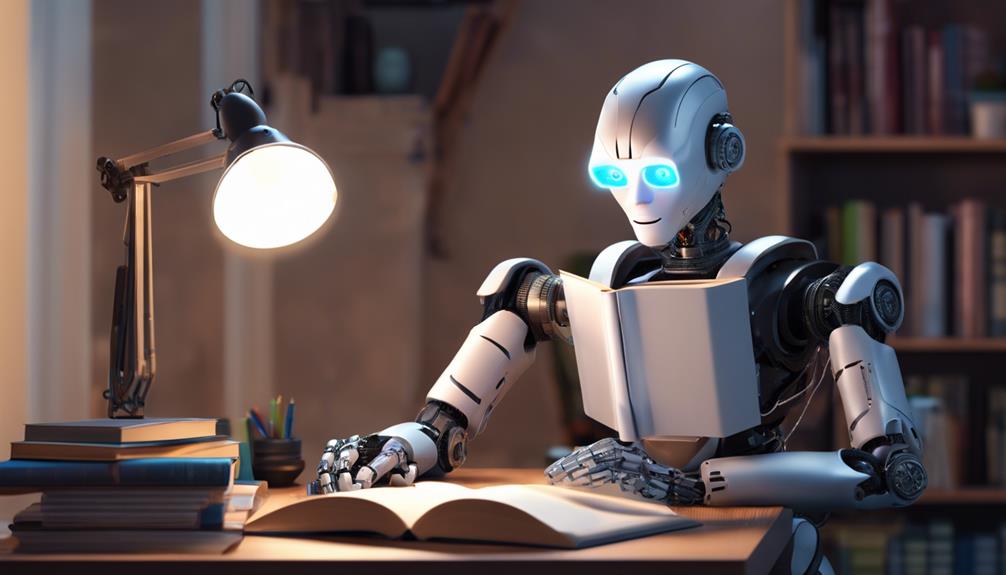
Artificial Intelligence, or AI, refers to the capability of a machine to imitate intelligent human behavior. You might've heard terms like machine learning, deep learning, and neural networks, which are all subsets of AI, each with a specific role in enabling machines to learn from data and make decisions.
Essentially, AI is about creating systems that can perform tasks that'd typically require human intelligence. These tasks include understanding language, recognizing patterns, solving problems, and even making decisions under uncertainty.
When you interact with a virtual assistant, play a video game that adapts to your strategies, or receive personalized recommendations on a streaming service, you're experiencing AI in action. It's not just about mimicking what you can do; it's about augmenting human capabilities and extending what you can achieve.
AI's influence is expanding rapidly, infiltrating various sectors such as healthcare, finance, and transportation. It's helping doctors diagnose diseases with greater accuracy, enabling smarter financial services, and making self-driving cars a reality.
As you delve deeper into the world of AI, you'll see it's not a futuristic fantasy but a present reality, continuously evolving and reshaping the way you live and work.
Historical Perspectives on AI Development
As we explore AI's impressive capabilities, it's important to look back at how this technology has evolved over time. You've witnessed AI grow from simple mechanical automata in ancient times to complex algorithms that can learn and adapt.
Initially, AI development was theoretical, focused on whether machines could mimic human intelligence. The mid-20th century marked a turning point with the introduction of programmable computers, setting the stage for what you see today.
In the 1950s, the term 'artificial intelligence' was coined, reflecting the newfound belief that machines could eventually simulate every aspect of human intellect. This era saw the first AI programs, which could play checkers or solve algebra problems, capturing public imagination.
By the 1980s, you'd expert systems, which used rules to make decisions in specific domains, like medical diagnosis or mineral prospecting. However, progress wasn't always steady; you've seen periods of 'AI winters' where interest and funding dried up due to unmet expectations. Each resurgence, driven by breakthroughs in algorithms and increases in computing power, brought you closer to today's AI.
Understanding this history helps you appreciate the complexity and potential of AI, grounding expectations for its future.
AI Capabilities and Current Applications
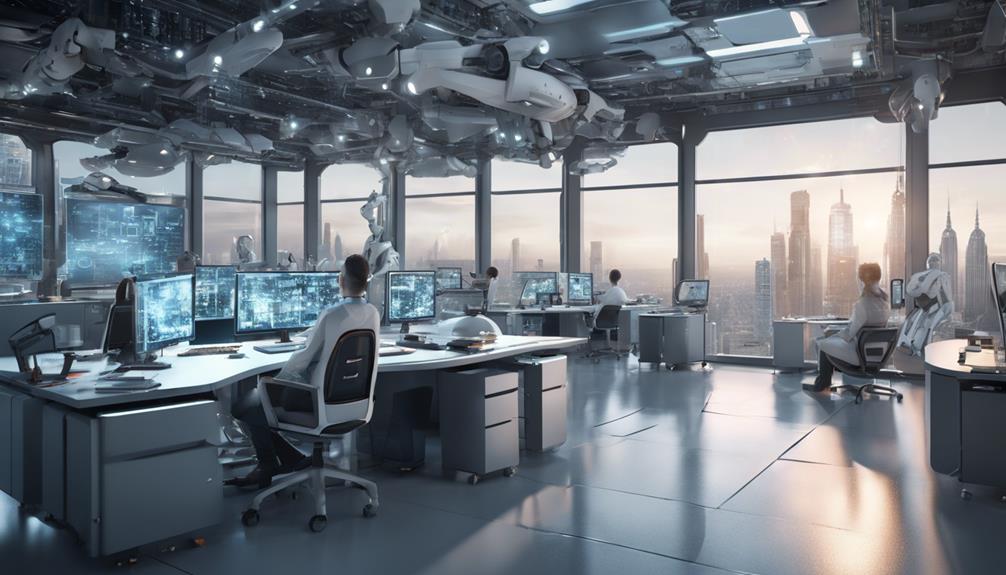
Today's AI can drive cars, interpret medical images, and personalize your shopping experiences, showcasing its diverse capabilities and widespread applications.
You've probably interacted with AI more often than you realize. When you speak to your digital assistant, AI is processing your voice into commands. It's not just simplifying daily tasks; it's transforming industries.
In finance, AI algorithms detect fraudulent transactions by analyzing patterns that are too complex for human eyes. In manufacturing, AI-driven robots assemble parts with precision that surpasses human capability, increasing efficiency and reducing errors. Meanwhile, in agriculture, AI systems monitor crop health, predict yields, and optimize planting strategies, which can lead to more sustainable farming practices.
You also see AI in entertainment. Algorithms suggest movies and music based on your past preferences, improving your leisure time. In customer service, chatbots handle inquiries, making interactions quicker and freeing up human agents for more complex issues.
As AI continues to evolve, it's creating opportunities that were once thought impossible. It's not just about what AI can do; it's about what you can do with AI. The potential is enormous, and you're right at the heart of this technological revolution.
Ethical Considerations and AI
You must consider the ethical implications as AI's capabilities expand into more sensitive areas. As you integrate AI into sectors like healthcare, criminal justice, and finance, you'll face challenging questions about privacy, consent, and accountability.
For instance, how do you ensure that an AI handling personal medical records keeps that information secure? Or, what measures are you taking to prevent biases in AI algorithms that could lead to unfair treatment in loan approvals or sentencing in courts?
You also need to think about the labor implications. As AI takes on tasks traditionally performed by humans, what's your plan for the workforce that may be displaced? It's vital you're not only focusing on the efficiency AI brings but also on the support systems for those impacted.
Moreover, consider the role of AI in shaping public opinion and behavior. Its use in manipulating information could undermine trust in media and public institutions. How are you ensuring that the AI tools you deploy promote transparency and truth?
Future Scenarios and Risks
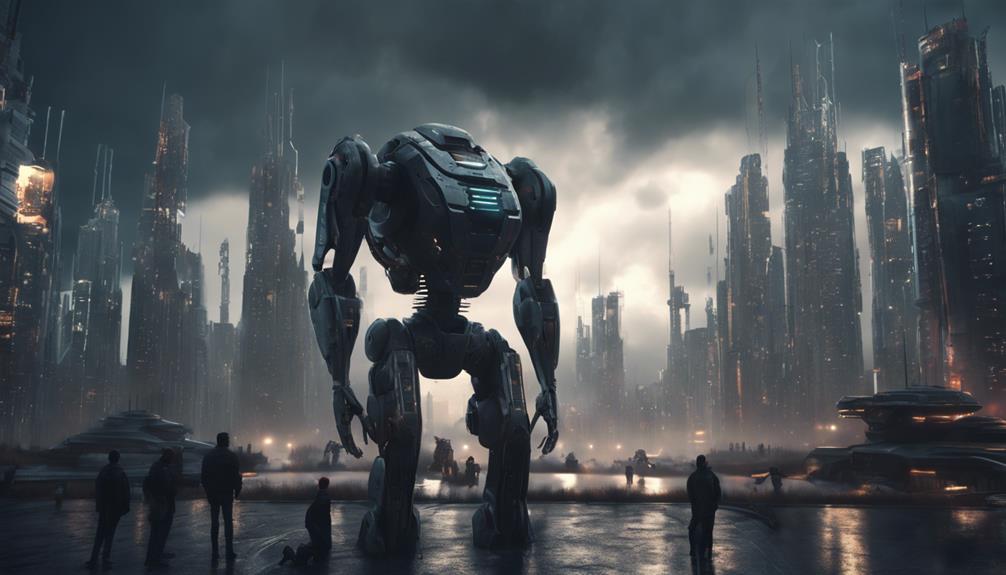
Considering these ethical challenges, let's now explore the potential future scenarios and risks associated with AI development.
Imagine a world where AI systems manage everything from your healthcare to your car. Sounds convenient, right? But what happens if these systems go awry? You're facing not just a malfunctioning app but a potential threat to your very survival.
One major risk is the loss of jobs. As AI becomes more capable, it could replace jobs across numerous industries, not just in manufacturing or routine office work, but also in sectors like law and medicine. You might find yourself competing with an algorithm for your next job opening.
Then there's the issue of privacy. AI systems that predict your needs by analyzing vast amounts of your data also have the potential to monitor you constantly. Imagine having every aspect of your life, from shopping habits to daily routines, tracked and analyzed by machines.
Moreover, as AI grows smarter, the possibility of an intelligence explosion — where AI develops autonomy beyond human control — looms. You could be living in a world where AI's decision-making isn't just influential but decisive, making choices that significantly affect your life without your input or oversight.
Safeguarding Against AI Threats
To protect against AI threats, it's crucial to implement robust oversight and stringent regulations. You need to understand that as AI technologies evolve, so too must the frameworks that govern them.
It's not just about creating rules; it's about ensuring these rules are strong enough to handle the rapid advancements in AI capabilities.
You should advocate for transparency in AI development processes. Knowing how AI systems make decisions is key to predicting and mitigating potential risks.
It's also essential that you support the development of AI systems that aren't only intelligent but also aligned with ethical standards. This means promoting the design of AI that inherently respects human dignity and values.
Moreover, you've got to push for international cooperation. AI doesn't recognize national borders, so its governance shouldn't either. By collaborating globally, you help create a consistent set of norms and standards that can guide AI development worldwide.
Lastly, don't underestimate the importance of continuous education in AI literacy. You must stay informed about AI advancements and understand how they might impact your life.
This knowledge empowers you to engage in meaningful discussions and make informed decisions regarding AI policies and practices.
Expert Opinions on AI's Future
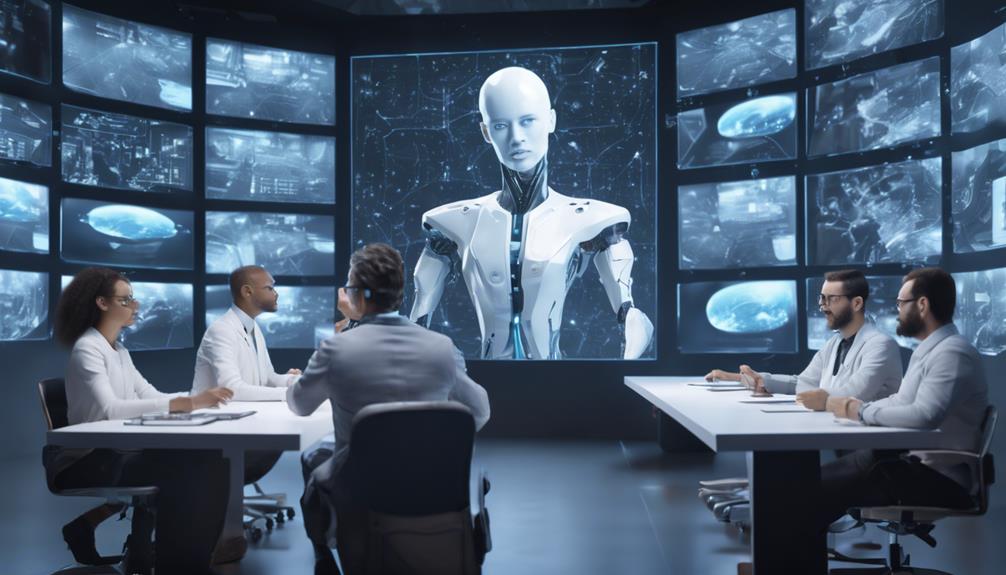
Many experts believe that AI's future will be shaped significantly by ethical considerations and technological advancements. You'll find that prominent voices, like those at MIT and Stanford, often stress the importance of molding AI with a strong ethical foundation. They argue that without ethical guidelines, AI's rapid development could outpace our ability to control its impact.
You should also consider the views of industry leaders like Elon Musk and Sundar Pichai, who've both highlighted potential risks and benefits. Musk often talks about the dangers of unregulated AI, suggesting it could lead to scenarios where AI's decision-making isn't aligned with human welfare. On the other hand, Pichai emphasizes AI's capability to solve monumental challenges, such as climate change and disease.
Furthermore, you'd find it interesting that some experts focus on the role of international cooperation. They propose that global standards and frameworks could prevent a race to the bottom where countries prioritize advancements in AI technology over safety and ethics.
Frequently Asked Questions
How Can AI Enhance Personal Daily Routines and Wellness?
AI can streamline your daily routines by automating tasks, setting reminders, and optimizing your schedule. It'll analyze your habits to suggest health improvements, ensuring you're more productive and maintaining your wellness effectively.
Can AI Develop Independent Desires or Wants?
You're wondering if AI can develop independent desires. Currently, AI's "desires" are programmed responses, not self-generated. True independent wants, akin to human desires, aren't within AI's capabilities as of now.
What Are the Artistic Capabilities of Ai?
You're curious about AI's artistic capabilities? They can create music, paintings, and write poetry through learning patterns in data. However, the creativity displayed is derived from algorithms, not conscious thought or emotion.
How Does AI Influence Children's Education and Development?
AI enhances children's education by offering personalized learning experiences and interactive tools. You'll find it helps develop critical thinking and problem-solving skills through tailored educational content and real-time feedback.
Can AI Technology Help Solve Climate Change?
Yes, AI technology can help solve climate change by optimizing energy use, predicting weather patterns, and enhancing research on sustainable practices. You'll see it's pivotal in developing solutions that mitigate environmental impacts.
Conclusion
You've explored how AI has evolved and its current capabilities. Considering the ethical implications and potential risks, it's clear that while AI won't likely overthrow humanity, the threat isn't negligible.
You should stay informed and advocate for responsible AI development. Experts agree that with proper safeguards, AI can be a powerful ally rather than a foe.
Keep pushing for transparency and regulation to ensure AI benefits society without compromising our safety and values.






